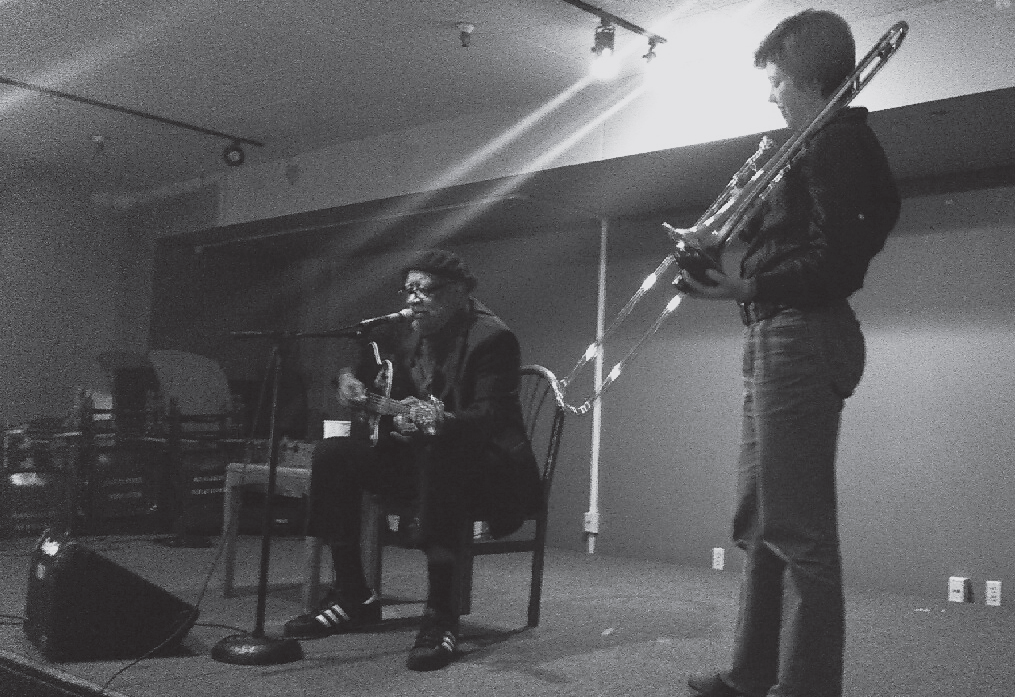
By Connor May
Feet were tapping, hands were clapping, and bodies were dancing on Monday, March 20, in the Rendezvous room next door to the Cellar). Grammy nominee and blues historian and musician Bill Sims treated University of Puget Sound students to a riveting but intimate performance of raw and true blues songs. The songs were simple, but powerful. Sims commanded the room as he strummed away and sang the blues. He played the blues in its most original form, mainly playing slave songs.
DownBeat Dance, a University of Puget Sound campus dance club, also attended and enjoyed the live music by moving and gooving to Sims’ sweet songs in the basement of the Student Union Building.
Rachel Schroder, a senior and a Classics major here at the University of Puget Sound, was at the event and also had the pleasure of playing alongside Mr. Sims onstage. Schroder plays the trombone for the University of Puget Sound Jazz Orchestra, and she too blew us away. The whole show was so welcoming that just about anyone would have had no problem melting into the deep sounds and the deep voice of Mr. Bill Sims.
“It was fantastic,” Schroder said about playing with Bill Sims. “It was such a cool experience, because I’ve been in bands since elementary school and it has always been about reading music and being pretty formulaic in how we would approach music. The way that Bill taught it was that he played the same chords over and over again until I started to feel them. It was just so much more authentic and real than working from the music on a page.”
A blues master, multi-instrumentalist, vocalist and award winner, Sims was musician from the get-go. At only four years old, when he was living with his family down south in rural Georgia, Sims first learned how to play the piano. By the time he was fourteen years old, he was already on stage sharing his gift in a professional rhythm and blues group.
Not only does he perform and act as a recording artist, but he is quite the accomplished musical director too. You all know and love the movie “American Gangster.” Well. Sims played guitar for many of the tracks in the film as well as for several other movies such as “Lackawanna Blues,” “Miss Ruby’s House” and “Cadillac Records.”
Hopping from one activity to the next, Sims spent the entire day on campus. He attended a class, conducted a question-and-answer hour, ate dinner with the Black Student Union and performed for one lovely hour during the evening. “We had a lot of fun,” Schroder said about the concert. “He talked about the history of blues, and he also played slave songs for us. It was meaningful to me because the music was completely grounded in its history. Blues has so much to it because it’s art and life, and there’s also the sexuality of it. It’s rooted in oppression and violence, and Bill managed to convey all of that in an hour-long concert. I was really moved by that!”
Schroder strongly believes that history is deeply important for us today. “Everything we do and every day is infused with history and its meaning. The more we understand about the way that our day-to-day engagements are filled with meaning from the lives that have come before us, the better we understand how power works in this world. When you are listening to music, there is a history and a reasoning behind that music. Knowing who made this music and why it was being made helps us to understand questions about today’s society and some of the issues we face. Specifically with blues music, being able to share the blues experience — not just the notes and the sounds of it — has a much deeper depth to the music and what it means and why we engage in it and how that music has shaped the culture that we live in now.” On Monday, March 20, at 7:30 p.m., those present were liberated through the dance, the music or the foot-tapping. Sims gave the audience a clean, uncut and raw performance of some of the most powerful music the U.S. has had to offer.

